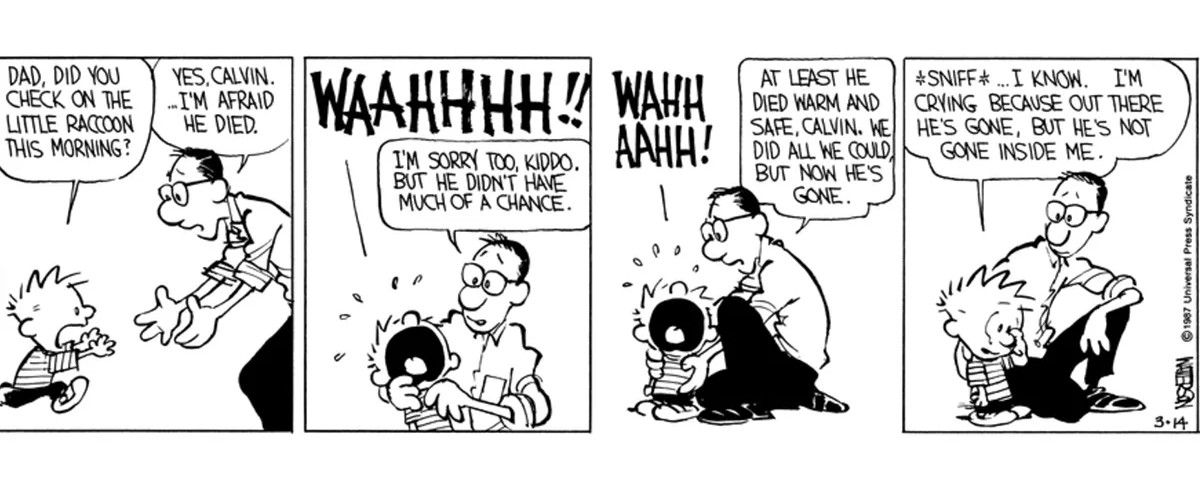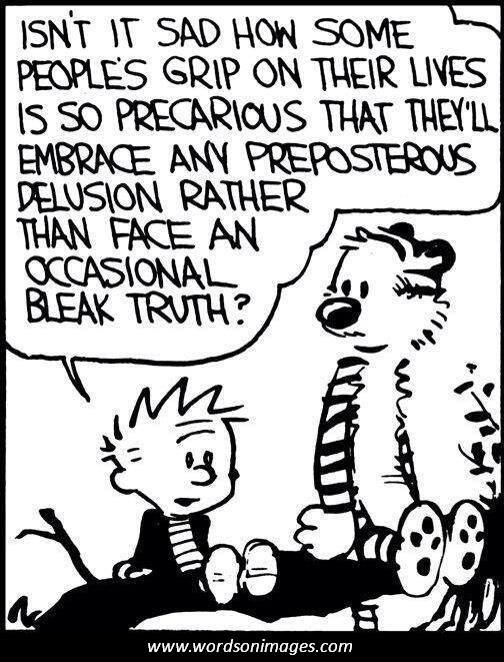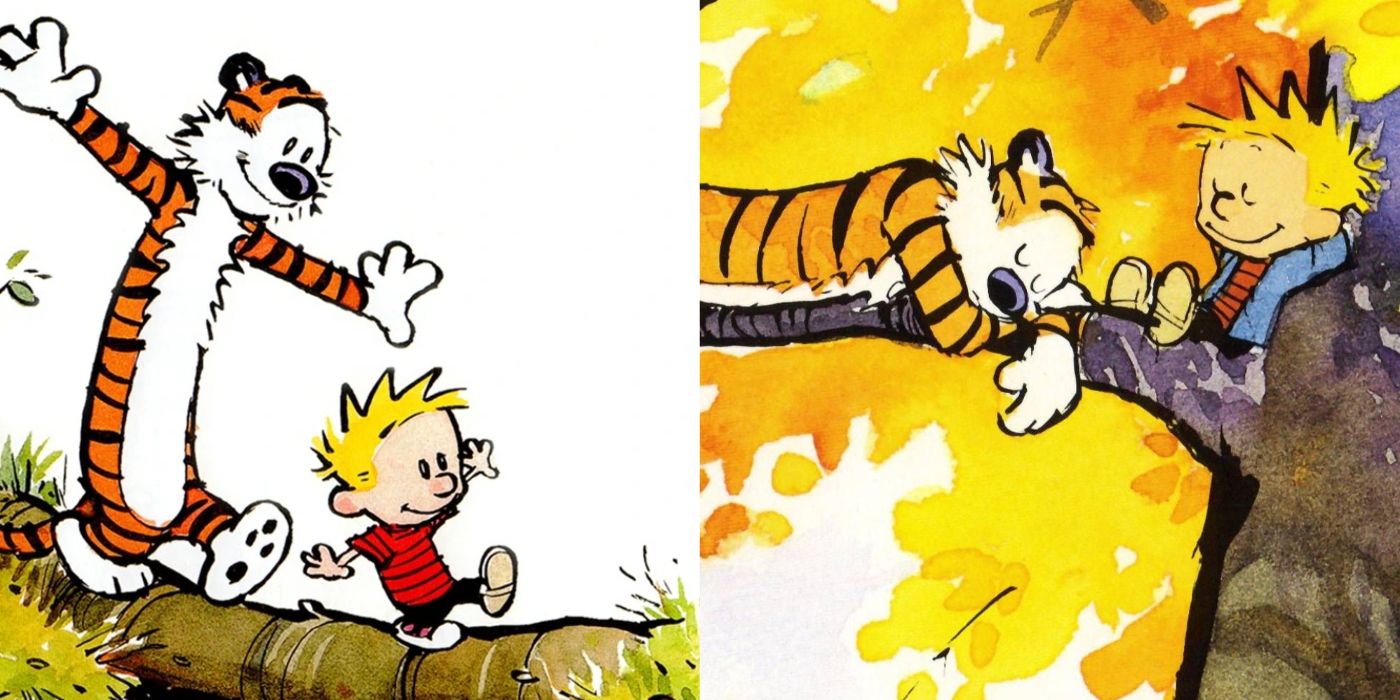Calvin And Hobbes Existentialism: A Deep Dive Into The Philosophical Adventures
Calvin and Hobbes existentialism is a fascinating concept that has intrigued fans of the comic strip for decades. It’s not just about a boy and his tiger; it’s about the deeper meaning behind their adventures. Bill Watterson, the creator of Calvin and Hobbes, masterfully weaves existential themes into the storyline, making it a timeless classic. This comic strip is more than just entertainment; it’s a philosophical journey that challenges the way we think about life, existence, and reality.
When you first encounter Calvin and Hobbes, you might think it’s just another fun comic strip for kids. But dig deeper, and you’ll find layers of existentialism that make you question the very fabric of existence. Through the eyes of a 6-year-old boy and his imaginary tiger, Watterson explores complex ideas that even philosophers struggle to articulate. It’s this blend of simplicity and complexity that makes the comic so captivating.
Calvin and Hobbes existentialism isn’t just a niche topic for intellectuals; it’s a universal theme that resonates with everyone. Whether you’re a child imagining your own adventures or an adult reflecting on the meaning of life, this comic strip has something to offer. It’s a mirror to our own existence, forcing us to confront questions we might otherwise ignore. So, let’s dive in and explore the philosophical world of Calvin and Hobbes.
Read also:101 Dining Lounge And Marina Your Ultimate Destination For Food Fun And Relaxation
Understanding Calvin and Hobbes Existentialism
Who Are Calvin and Hobbes?
Before we delve into the existential themes, let’s get to know the main characters. Calvin is a precocious 6-year-old boy with an overactive imagination and a penchant for mischief. Hobbes, on the other hand, is his stuffed tiger who comes to life in Calvin’s mind. To Calvin, Hobbes is a real, sentient being who participates in his adventures. But to everyone else, Hobbes is just a toy. This duality sets the stage for the existential exploration that unfolds throughout the series.
Here’s a quick breakdown of their personalities:
- Calvin: Brilliant, imaginative, and often rebellious, Calvin questions authority and seeks to understand the world on his own terms.
- Hobbes: Wise, witty, and a loyal companion, Hobbes often serves as the voice of reason amidst Calvin’s chaotic musings.
The Philosophy Behind Calvin and Hobbes
Existentialism 101
Existentialism is a philosophical movement that emphasizes individual freedom and responsibility. It suggests that life has no inherent meaning, and it’s up to each person to create their own purpose. Calvin and Hobbes existentialism embodies this idea by constantly questioning the nature of reality and existence. Through their adventures, Watterson explores themes like freedom, choice, and the search for meaning in a seemingly indifferent universe.
For example, Calvin often finds himself pondering the big questions: Why are we here? What is the purpose of life? These musings are not just idle thoughts but reflections of existentialist philosophy. Calvin’s imagination allows him to explore these ideas in ways that are both humorous and profound.
Calvin’s Worldview: A Child’s Perspective on Existence
Imagination as a Tool for Understanding
Calvin’s vivid imagination is the key to his existential exploration. Whether he’s imagining himself as a superhero, an explorer, or a mad scientist, Calvin uses his creativity to make sense of the world. This is a classic existentialist approach: using imagination to construct meaning in a world that often feels chaotic and meaningless.
Consider one of Calvin’s famous musings: “Sometimes I think the surest sign that intelligent life exists elsewhere in the universe is that none of it has tried to contact us.” This statement is both funny and thought-provoking, encapsulating the existential dread that often accompanies the search for meaning.
Read also:Sunday Brunch Corpus Christi Your Ultimate Guide To The Best Spots
Hobbes: The Voice of Reason
The Dynamic Duo
Hobbes serves as a counterbalance to Calvin’s wild imagination. While Calvin questions everything, Hobbes often provides a grounded perspective. This dynamic between the two characters mirrors the internal dialogue we all have when grappling with existential questions. On one hand, we have the dreamer who seeks to transcend reality, and on the other, the pragmatist who keeps us grounded.
For instance, when Calvin gets carried away with his grand ideas, Hobbes often responds with a simple, “Yeah, whatever.” This interaction highlights the tension between idealism and realism, a central theme in existentialist thought.
Existential Themes in Calvin and Hobbes
Freedom and Responsibility
One of the core tenets of existentialism is the idea that we are free to choose our own paths, but with that freedom comes responsibility. Calvin embodies this concept by constantly pushing boundaries and challenging authority. Whether he’s building a cardboard box into a time machine or writing his own rules for a game, Calvin asserts his independence and creativity.
However, this freedom also comes with consequences. Calvin often finds himself in trouble because of his choices, illustrating the existentialist belief that we must take responsibility for our actions. This theme is beautifully woven into the comic strip, making it relatable and thought-provoking.
The Search for Meaning
Life’s Big Questions
Calvin and Hobbes existentialism is deeply rooted in the search for meaning. Through their adventures, Watterson explores questions that have puzzled philosophers for centuries. What is the purpose of life? Why do we exist? These questions are not answered definitively in the comic strip, but that’s the beauty of existentialism. The journey itself is the meaning.
For example, in one strip, Calvin and Hobbes are sledding down a hill, and Calvin muses, “You know, the thing about life is that you never know what’s coming next.” This simple statement encapsulates the existentialist belief that life is unpredictable and that meaning is found in the present moment.
Calvin and Hobbes: A Reflection of Our Own Existence
The Universal Appeal
What makes Calvin and Hobbes existentialism so compelling is its universal appeal. While the characters are fictional, their struggles and musings resonate with readers of all ages. Whether you’re a child imagining your own adventures or an adult reflecting on the meaning of life, Calvin and Hobbes have something to say to you.
This universal appeal is a testament to Watterson’s skill as a storyteller. By using simple, everyday scenarios, he manages to convey complex philosophical ideas. It’s this ability to make the profound accessible that makes Calvin and Hobbes such a beloved classic.
Impact on Popular Culture
Influence Beyond the Comic Strip
Calvin and Hobbes existentialism has had a lasting impact on popular culture. The comic strip has inspired countless artists, writers, and thinkers who have drawn inspiration from its philosophical depth. It’s not uncommon to see references to Calvin and Hobbes in movies, TV shows, and even academic papers.
For example, the strip’s exploration of imagination and reality has influenced works in the science fiction and fantasy genres. Its emphasis on individual freedom and responsibility has also resonated with those interested in existentialist philosophy. Calvin and Hobbes has become a cultural touchstone, a reference point for discussions about the human condition.
Conclusion: Embracing the Journey
Calvin and Hobbes existentialism is more than just a comic strip; it’s a philosophical journey that challenges us to think deeply about our own existence. Through the adventures of a 6-year-old boy and his imaginary tiger, Bill Watterson has created a timeless classic that speaks to the heart of what it means to be human.
So, the next time you find yourself pondering the big questions, remember Calvin and Hobbes. Life may not have a clear-cut answer, but the journey itself is what makes it meaningful. And who knows? Maybe, just maybe, the meaning of life is as simple as sledding down a hill with your best friend.
What are your thoughts on Calvin and Hobbes existentialism? Share your musings in the comments below, and don’t forget to check out our other articles for more insights into the world of philosophy and pop culture. Until next time, keep exploring and keep questioning!
Table of Contents
- Understanding Calvin and Hobbes Existentialism
- The Philosophy Behind Calvin and Hobbes
- Calvin’s Worldview: A Child’s Perspective on Existence
- Hobbes: The Voice of Reason
- Existential Themes in Calvin and Hobbes
- The Search for Meaning
- Calvin and Hobbes: A Reflection of Our Own Existence
- Impact on Popular Culture
- Conclusion: Embracing the Journey
Article Recommendations


